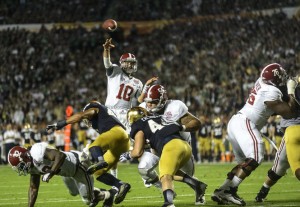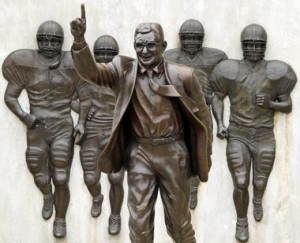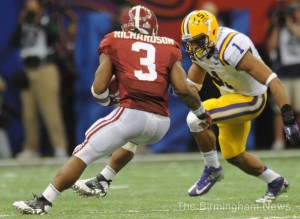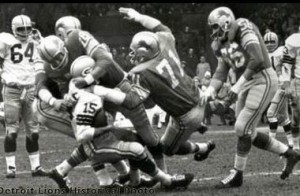 Tomorrow will be the first physical birthday I have had when I can’t call my twin brother Jimmy. Today in heaven he is far better off than I am on earth. Bittersweet. Memories hit me strangely sometimes coming out of nowhere. This week it was a sixth grade memory. During recess the guys were playing touch football. Jimmy and I were smaller than the other guys and we were the “good students” so they did not give us much credence as athletes. But we played with them. For some strange reason they decided to let Jimmy be the quarterback of one team for awhile. I went out as a receiver. We were fast although the other guys didn’t know it. We had the ball around the 20-yard line. When the ball was hiked, I took off as fast as I could. Jimmy at QB launched it as far as he could. It was a perfect pass right to me. A young lad named Larry Brown, who would later play running back at our high school, caught me from behind just before I crossed the goal line. I think Jimmy and I changed some thoughts about us on that one play — the greatest passing play of all time, if you don’t mind me saying so!
Tomorrow will be the first physical birthday I have had when I can’t call my twin brother Jimmy. Today in heaven he is far better off than I am on earth. Bittersweet. Memories hit me strangely sometimes coming out of nowhere. This week it was a sixth grade memory. During recess the guys were playing touch football. Jimmy and I were smaller than the other guys and we were the “good students” so they did not give us much credence as athletes. But we played with them. For some strange reason they decided to let Jimmy be the quarterback of one team for awhile. I went out as a receiver. We were fast although the other guys didn’t know it. We had the ball around the 20-yard line. When the ball was hiked, I took off as fast as I could. Jimmy at QB launched it as far as he could. It was a perfect pass right to me. A young lad named Larry Brown, who would later play running back at our high school, caught me from behind just before I crossed the goal line. I think Jimmy and I changed some thoughts about us on that one play — the greatest passing play of all time, if you don’t mind me saying so!
Archive for category Sports
 Like most of you, I have been somewhat riveted by the debate of recent times spawned by the refusal of some NFL players to stand and show respect for the US Flag during the national anthem before games. The President waded into that debate over the last weekend, perhaps unwisely, but time will tell. What I want to concentrate on here is tangent to the debate, but still important. Jim Harbaugh, the Michigan football coach, responded by telling the President to read the Constitution. If I understand his statement correctly, he was suggesting that the President was violating the free speech rights of the NFL players given in the First Amendment. But this is patently untrue. It is a fallacy we all fall into sometimes. When we are debating someone else, especially if that someone else is a good debater, we resort to a false challenge. This happens a lot from those on the Left side of the political spectrum but they are not by themselves. What they are really arguing for is “freedom from criticism.” The First Amendment does not say we have freedom from criticism. NFL players who are unhappy with America have the right to criticize by kneeling down during the national anthem. Others have the right to criticize those players if they disagree. Even Presidents have freedom of speech, although we can criticize them and even vote them out of office. As a Pastor and Seminary prof, I received plenty of criticism. If we are supposed to be free from criticism, I want to pass the offering plate again. Somebody out there owes me something!
Like most of you, I have been somewhat riveted by the debate of recent times spawned by the refusal of some NFL players to stand and show respect for the US Flag during the national anthem before games. The President waded into that debate over the last weekend, perhaps unwisely, but time will tell. What I want to concentrate on here is tangent to the debate, but still important. Jim Harbaugh, the Michigan football coach, responded by telling the President to read the Constitution. If I understand his statement correctly, he was suggesting that the President was violating the free speech rights of the NFL players given in the First Amendment. But this is patently untrue. It is a fallacy we all fall into sometimes. When we are debating someone else, especially if that someone else is a good debater, we resort to a false challenge. This happens a lot from those on the Left side of the political spectrum but they are not by themselves. What they are really arguing for is “freedom from criticism.” The First Amendment does not say we have freedom from criticism. NFL players who are unhappy with America have the right to criticize by kneeling down during the national anthem. Others have the right to criticize those players if they disagree. Even Presidents have freedom of speech, although we can criticize them and even vote them out of office. As a Pastor and Seminary prof, I received plenty of criticism. If we are supposed to be free from criticism, I want to pass the offering plate again. Somebody out there owes me something!
“We won!” — as if I had anything to do with it, other than my strong wishes and yelling at the television. I “feel” like I had some impact. But if they lose, “they” lost it. Alabama, my team, on January 7 won the national college football title casting away past demons of loss to the Notre Dame Fighting Irish, a team with a great heritage. The score of 42 to 14 was surprising at least to me. I expected something like 21 to 17 or 17 to 13. It caught a lot of people by surprise.
won the national college football title casting away past demons of loss to the Notre Dame Fighting Irish, a team with a great heritage. The score of 42 to 14 was surprising at least to me. I expected something like 21 to 17 or 17 to 13. It caught a lot of people by surprise.
At my house, we had about 18 people, family and good friends, who all rooted for Alabama. But the main thing was using the game as a time for a party. Everyone there was a Christian. Before the game, we prayed a blessing on the great food spread and asked God’s favor for our fellowship. And if our team had lost, we would have been extremely disappointed…BUT we would not have pouted long. Football is a game. I know it is big business, even at the college level. But there are things in life a lot more important than football. Football can give discipline to the players. It can keep them off the streets and maybe keep some fans off the streets. The hold of football on our culture, however, seems to be something deeply ingrained in us. It holds great attraction and at times can distract us from other things. We must be careful not to let it consume us while we partake of the joy that it brings, a joy that nonetheless can never match the joy of knowing and serving Christ, who died to take away our sins.
 This weekend we saw the sad removal of the Joe Paterno statue that was outside Penn State’s football stadium. I had mixed feelings, understanding both the many good things that Paterno had stood for and, along with many others, the new revelations of Paterno’s conduct in the Sandusky sexual abuse scandal. Last September I had gone to a game at Penn State when my own team, the Alabama Crimson Tide, was visiting. I was able to see the statue, many of us taking pictures. This was before everything became public. I am glad that I got to experience the statue as it was meant to be. One of the problems that some have discussed on talk radio and elsewhere is the worship of a man that comes with such adulation that a statue is made of him–especially in the field of sports. There is also the worry that there is too much power in one individual without proper checks and balances in the institution. Nonetheless, I still had mixed feelings as they carted the statue away, wondering if it was not overkill. We must pray for those in authority at Penn State as they try to walk through the difficult maze they find themselves in at the present time. I would not want to change places with them. Read the rest of this entry »
This weekend we saw the sad removal of the Joe Paterno statue that was outside Penn State’s football stadium. I had mixed feelings, understanding both the many good things that Paterno had stood for and, along with many others, the new revelations of Paterno’s conduct in the Sandusky sexual abuse scandal. Last September I had gone to a game at Penn State when my own team, the Alabama Crimson Tide, was visiting. I was able to see the statue, many of us taking pictures. This was before everything became public. I am glad that I got to experience the statue as it was meant to be. One of the problems that some have discussed on talk radio and elsewhere is the worship of a man that comes with such adulation that a statue is made of him–especially in the field of sports. There is also the worry that there is too much power in one individual without proper checks and balances in the institution. Nonetheless, I still had mixed feelings as they carted the statue away, wondering if it was not overkill. We must pray for those in authority at Penn State as they try to walk through the difficult maze they find themselves in at the present time. I would not want to change places with them. Read the rest of this entry »
 On January 9, about fifteen people, all Alabama fans (two graduates) and all Bible-believing Christians partied at my house as we watched the national championship game between my team the Alabama Crimson Tide and the Tigers from LSU. The outcome (21-0 BAMA) was pleasing to all of us and with excitement, we indeed proved that Baptists can dance!
On January 9, about fifteen people, all Alabama fans (two graduates) and all Bible-believing Christians partied at my house as we watched the national championship game between my team the Alabama Crimson Tide and the Tigers from LSU. The outcome (21-0 BAMA) was pleasing to all of us and with excitement, we indeed proved that Baptists can dance!
Within a week, however, one of the Bama stars, a defensive back was arrested for possession of marijuana. Deflating, yes…unexpected, no. Our present evil age continues to degenerate all around us (at least in North America) as biblical living grows less attractive to a hedonistic society. I will always root for the Tide being a graduate from the University of Alabama in Huntsville and having grown up in the state as an Alabama Crimson Tide and Bear Bryant fan. I also understand the character building that can be in sports. But students must receive and embrace the lessons for real life. While I enjoy football as a fan, I refuse to let it become the center of my life. On the days when BAMA loses, Jesus is still raised from the dead and at the right hand of the Father. While I always look forward to football season and how my team will do, I am looking ahead far more to the glorious appearing of my God and Savior, the Lord Jesus Christ.
 Today, Novemeber 24, 2011, the people of the United States celebrate Thanksgiving, a holiday that ultimately remembers the Pilgrims and early foundings of the colonies that eventually became the United States. Those of us who are Christians add our own desire to thank God for all the things that He has done through Christ, is continuing to do for us, and will do one day when He returns. Seeing that the Pilgrims were Christians we identify with them when others in our culture do not.
Today, Novemeber 24, 2011, the people of the United States celebrate Thanksgiving, a holiday that ultimately remembers the Pilgrims and early foundings of the colonies that eventually became the United States. Those of us who are Christians add our own desire to thank God for all the things that He has done through Christ, is continuing to do for us, and will do one day when He returns. Seeing that the Pilgrims were Christians we identify with them when others in our culture do not.
However, the mainstay of the holiday in America has come to be family, food, and football. I do not view those as evils in and of themselves. They all have a special place in our hearts. Outside of our relationship to God, there is nothing more significant that our relationship to our families. Of course, I have always had a special relationship to food! There has never been a pumpkin pie I did not like. I could talk about my family with great emotion and remember the family feasts in very positive terms. But here I want to talk about football, not as a man who loves football, but in a way that shows the connection of football and family. Read the rest of this entry »
In an earlier post, I had mentioned Tom Krattenmaker’s book Onward Christian Athletes which is critical of the influence that evangelicals have in the sports world in America. I am scheduled to give a faculty forum paper on “Evangelicals and Sports” in chapel at BBS on November 8 (in about a month). I am interacting mostly with this book but not exclusively. My research assistant, Stephen Stallard (my nephew), has been digging for articles and books on the topic from our library and elsewhere.
In my continued reading and meditation on this topic and of Krattenmaker’s book, I have come to agree with some of the things that are being said. However, I am still concerned about what I perceive to be perhaps one more way in which the pluralists in society are trying to marginalize those who believe in absolute truth. In one article in USA Today (“And I’d like to thank God Almighty,” Oct 12, 2009), Krattenmaker notes “But Jesus’ representatives in sports aren’t just practicing faith. They are also leveraging sports’ popularity to promote a message and doctrine that are out of sync with the diverse communities that support franchises, and with the unifying civic role that we expect of our teams.” His first statement that evangelicals in sports are not just practicing their faith is problematic on the face of it for me. Evangelicals believe that evangelism is part of their faith, not something in addition to practicing their faith. Taken to its logical conclusion Krattenmaker’s approach seems only to want those at the table of sports who never try to persuade others to their view. He needs to restate this differently to come across reasonably to evangelicals. I also wonder about the idea of a unifying civic role for sports. Regional pride certainly exists, but to use this to argue against Baseball Chapel might be a bit much. I am looking forward to writing the paper — I’ll probably start over the upcoming weekend. I will outline both where I agree and where I disagree.
I will post my paper in my articles section and attach it to a post when I am finished with it.
I was deeply saddened this morning when I heard that Ernie Harwell, the long-time broadcaster of Detroit Tigers baseball games on the radio (1960 to 2002), had passed away at the age of 92. He had once said a thank you to all those young boys who had hidden their transistor radios under their pillows so they could listen to the radio games after they had gone to bed. I was one of those boys during the 1960s although I lived in the state of Alabama! WJR Detroit would come in really strong especially on cloudy days. I well remember Ernie announce the homeruns of my childhood hero, Al Kaline.
However, something else attracted me to this man Ernie Harwell after I became a born-again Christian in 1974. Early on I learned that he too had come to Christ. His testimony was that he had come to Him as the result of the ministry of Billy Graham. As I have said under “My Story” I too came to the Lord largely through Dr. Graham’s messages which caused me to search out a local church where I could follow-up and really understand. The secular sports media’s accolades which have poured forth this day in tribute to Harwell show that it is possible to be a good testimony for Christ in the sports industry and make a difference in people’s lives.
My thinking about the relationship of evangelicals to sports started in earnest years ago when I read a book entitled God in the Stadium: Sports and Religion in America by Robert J. Higgs, a book for which I wrote a review in The Journal of Ministry and Theology. Right now I am reading a book by Tom Krattenmaker entitled Onward Christian Athletes: Turning Ballparks into Pulpits and Players into Preachers. Krattenmaker appears to be a left-wing secularist/pluralist although to be fair I have to reserve final judgment since I have only read two chapters. He notes his desire that the Fellowship of Christian Athletes should have been a broader organization something along the lines of Fellowship of Religious Athletes instead. I plan on doing a paper on evangelicalism and sports to be delivered at the Seminary this coming Fall. Apparently, there are several criticisms of evangelicals in sports that are coming out right now (it may be fashionable critique against evangelicalism in general).
There is no doubt in my mind that our culture overdoses on sports. Yet athletic competition seems to be built into the fabric of how human beings, especially men, think and play. This appears to be true in the first century as it is today. This is another relationship that needs to be thought about deeply.
